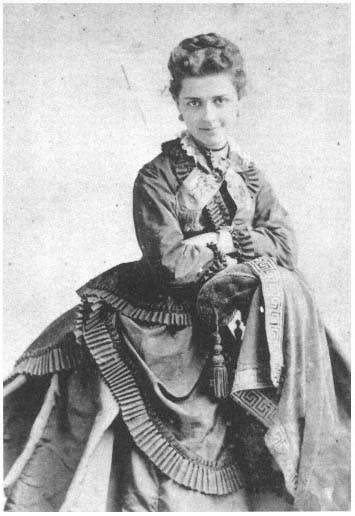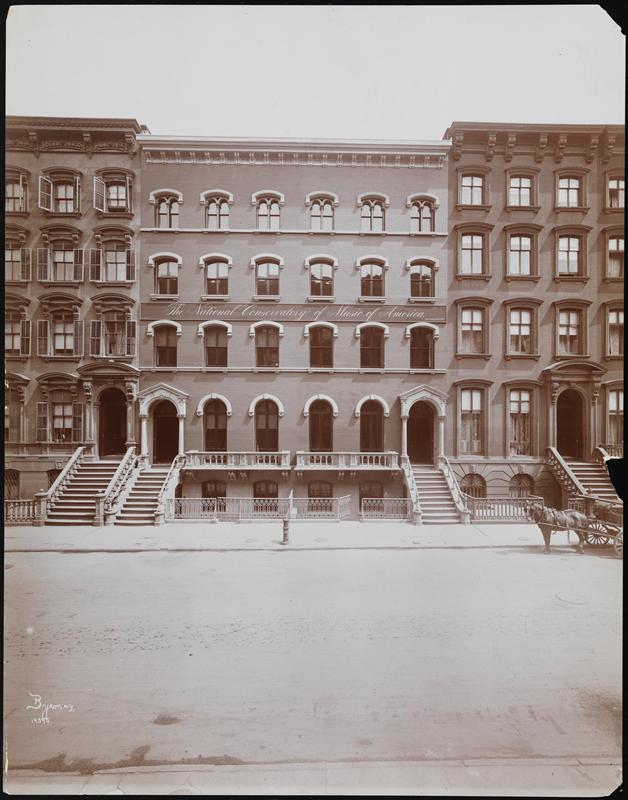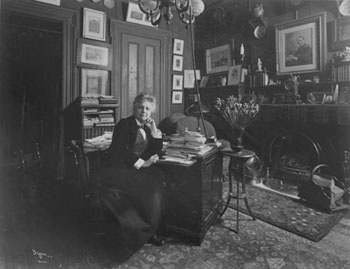Jeannette Thurber on:
[Wikipedia]
[Google]
[Amazon]

 Jeannette Thurber (also known as Jeannette Meyers Thurber; January 29, 1850 in
Jeannette Thurber (also known as Jeannette Meyers Thurber; January 29, 1850 in
 In 1884 Thurber sponsored New York City's first
In 1884 Thurber sponsored New York City's first
by Michael Cooper, '' Thurber's continuing difficulties in securing funding for her school—either public or private—and her flagging energy as she grew older, contributed to the demise of the school, but her success did as well: music schools started springing up, competing for faculty and students. On the other hand, her school was written out of the record of musical history well before the doors had even closed. "It is conspicuously absent from Elson's ''National Music of America'', written in 1899, nor is there any reference to it in Waldo Selden Pratt's 1909 ''History of Music'', yet the school was still advertising nationally and enrolling hundreds of students."
Scholars suggest it could be because the school had been pigeon-holed as being "specifically successful in helping students of foreign birth and certain special classes, like the blind and those of Negro blood". Or because the orchestra had a "a sprinkling of girls", as the ''
Thurber's continuing difficulties in securing funding for her school—either public or private—and her flagging energy as she grew older, contributed to the demise of the school, but her success did as well: music schools started springing up, competing for faculty and students. On the other hand, her school was written out of the record of musical history well before the doors had even closed. "It is conspicuously absent from Elson's ''National Music of America'', written in 1899, nor is there any reference to it in Waldo Selden Pratt's 1909 ''History of Music'', yet the school was still advertising nationally and enrolling hundreds of students."
Scholars suggest it could be because the school had been pigeon-holed as being "specifically successful in helping students of foreign birth and certain special classes, like the blind and those of Negro blood". Or because the orchestra had a "a sprinkling of girls", as the ''
"View From Even Further East: The Importance of Being Europe"
by Daniel Freisenfeld, ''
"In Conversation
with
Jeannette Thurber's
connection to Dvořák's ''Te Deum'', Op. 103.
by Tali Makell, music director of the Chamber Philharmonia of New York {{DEFAULTSORT:Thurber, Jeannette American philanthropists Impresarios American socialites 1850 births 1946 deaths Women in classical music 19th-century American women 20th-century American women 20th-century American people American people of Danish descent

 Jeannette Thurber (also known as Jeannette Meyers Thurber; January 29, 1850 in
Jeannette Thurber (also known as Jeannette Meyers Thurber; January 29, 1850 in Delhi, New York
Delhi ( ) is a town in Delaware County, New York, United States. The population was 4,795 at the 2020 census.US Census Bureau, 2020 Census, Delhi town, Delaware County, New York https://www.census.gov/search-results.html?searchType=web&cssp=SERP ...
– January 2, 1946 in Bronxville, New York
Bronxville is a village in Westchester County, New York, United States, located approximately north of Midtown Manhattan. It is part of the town of Eastchester. The village comprises one square mile (2.5 km2) of land in its entirety, a ...
) was amongst the first major patrons of classical music
Classical music generally refers to the art music of the Western world, considered to be distinct from Western folk music or popular music traditions. It is sometimes distinguished as Western classical music, as the term "classical music" also ...
in the United States. Thurber established the National Conservatory of Music of America
The National Conservatory of Music of America was an institution for higher education in music founded in 1885 in New York City by Jeannette Meyers Thurber. The conservatory was officially declared defunct by the state of New York in 1952, altho ...
in 1885—the first of its kind and an endeavor that some say ushered in the first orchestral music with a distinctively American sound. But in a very radical stance for the day, Thurber championed the rights of women, people of color and the handicapped to attend her school, sometimes on full scholarship. This was 1885—not too long after the Civil War—and her school was racially integrated, promoted women, and had an inclusive stance toward the handicapped.
Thurber founded the school in part because of her belief that a nation should cultivate its own unique music—an unusual stance when the prevailing attitude was that all cultured art, especially orchestral music, came from Germany or Italy. While running the school, she sponsored competitions for American musicians to develop American music.
The National Conservatory of Music of America was the outstanding institution for professional musical preparation in the United States for some 25 years or more. At its height in the 1890s it boasted a faculty of international renown ... and initiated a course of studies whose features became a basis for the curriculum now taken for granted in the colleges and conservatories of this country. Its achievements resulted from the endeavors of a single visionary: Jeannette M Thurber, a wealthy, idealistic New Yorker who devoted most of her life to the school ... Although her innovative design for the Conservatory was influential in shaping the course of American music for the 20th century, Mrs. Thurber and her school have slipped into undeserved obscurity."
Life
Jeannette Meyers was the daughter of Henry Meyers, an immigrant violinist fromCopenhagen
Copenhagen ( or .; da, København ) is the capital and most populous city of Denmark, with a proper population of around 815.000 in the last quarter of 2022; and some 1.370,000 in the urban area; and the wider Copenhagen metropolitan ar ...
, Denmark, and Annamarie Coffin Price. She was educated at the Paris Conservatory
The Conservatoire de Paris (), also known as the Paris Conservatory, is a college of music and dance founded in 1795. Officially known as the Conservatoire National Supérieur de Musique et de Danse de Paris (CNSMDP), it is situated in the avenue ...
, which inspired her to advocate for government funding of her school, as was done in France. On September 15, 1869, at the age of 19, she married Francis Beatty Thurber (Delhi, November 13, 1842 – Manhattan, July 4, 1907), who would later become a millionaire grocery wholesaler. The couple had two daughters, Marianne and Jeannette. The family had a summer home at Onteora Park in the Catskill Mountains
The Catskill Mountains, also known as the Catskills, are a physiographic province of the larger Appalachian Mountains, located in southeastern New York. As a cultural and geographic region, the Catskills are generally defined as those areas c ...
.
 In 1884 Thurber sponsored New York City's first
In 1884 Thurber sponsored New York City's first Wagner
Wilhelm Richard Wagner ( ; ; 22 May 181313 February 1883) was a German composer, theatre director, polemicist, and conductor who is chiefly known for his operas (or, as some of his mature works were later known, "music dramas"). Unlike most op ...
festival. In 1885 she founded the National Conservatory of Music of America
The National Conservatory of Music of America was an institution for higher education in music founded in 1885 in New York City by Jeannette Meyers Thurber. The conservatory was officially declared defunct by the state of New York in 1952, altho ...
and its adjunct American Opera Company The American Opera Company was the name of four different opera companies active in the United States. The first company was a short-lived opera company founded in New York City in February, 1886 that lasted only one season. The second company grew ...
, both in New York."The Deal That Brought Dvořák to New York"by Michael Cooper, ''
The New York Times
''The New York Times'' (''the Times'', ''NYT'', or the Gray Lady) is a daily newspaper based in New York City with a worldwide readership reported in 2020 to comprise a declining 840,000 paid print subscribers, and a growing 6 million paid ...
'', August 23, 2013 In 1888/89 she sponsored the New York debut of the Boston Symphony
The Boston Symphony Orchestra (BSO) is an American orchestra based in Boston, Massachusetts. It is the second-oldest of the five major American symphony orchestras commonly referred to as the " Big Five". Founded by Henry Lee Higginson in 1881, ...
. But the Conservatory seemed to be her real love, and she grew it from 84 students when it opened to 3,000 students in 1900. Her success was due, in part, to her conviction that her school required an outstanding and publicly-celebrated faculty: its first director was Jacques Bouhy, a world-renowned baritone.
In 1892, she was responsible for bringing the Czech composer Antonín Dvořák
Antonín Leopold Dvořák ( ; ; 8 September 1841 – 1 May 1904) was a Czechs, Czech composer. Dvořák frequently employed rhythms and other aspects of the folk music of Moravian traditional music, Moravia and his native Bohemia, following t ...
to the United States to head her conservatory, where he remained until 1895. Dvořák, who refused her offer several times, was ultimately persuaded by his wife, Anna Dvorak, when she learned of the staggering annual salary of $15,000, which was 25 times his current income. He was to receive four months' summer leave in exchange for three hours of daily teaching and six annual concerts. It was there that he met 26-year-old African-American student Harry Burleigh
Henry Thacker ("Harry") Burleigh (December 2, 1866 – September 12, 1949) was an American classical composer, arranger, and professional singer known for his baritone voice. The first black composer who was instrumental in developing cha ...
. Burleigh, who mopped floors to pay for his tuition, sang spirituals as he worked and drew the interest of Dvorak. Burleigh's rendering of African-American spirituals had a profound effect on Dvorak's compositions and served as the basis for one of his best-known symphonies, (with a title suggested by Thurber, it is said), "From the New World". Dvorak said, "In the Negro melodies of America I discover all that is needed for a great and noble school of music." Burleigh went on to assist Dvorak in copying sections of his work as his amanuensis, and ultimately became a well-known baritone and composer in his own right, as well as a faculty member at the Conservatory.
In addition to race and gender issues, Thurber championed the idea of a federally-funded conservatory and was very pointed about the fact that the United States was the only industrialized nation that did not provide government monies for the arts. Thurber "precipitated public debate over the appropriateness of a federally funded Conservatory of music in a capitalist society". In fact, the Institute of Musical Art of the City of New York, chartered in 1904 with the backing of Andrew Carnegie
Andrew Carnegie (, ; November 25, 1835August 11, 1919) was a Scottish-American industrialist and philanthropist. Carnegie led the expansion of the American steel industry in the late 19th century and became one of the richest Americans i ...
, was a privately funded institution and became her chief competition, and there is no indication in the public record that they accepted blacks, the handicapped or even women. The school ultimately morphed into the Juilliard School
The Juilliard School ( ) is a private performing arts conservatory in New York City. Established in 1905, the school trains about 850 undergraduate and graduate students in dance, drama, and music. It is widely regarded as one of the most el ...
. (Carnegie also was a founding patron of Thurber's Conservatory though some research suggests that other than a small amount from L. Horton and Andrew Carnegie, Thurber is the only one who contributed financial backing.)
 Thurber's continuing difficulties in securing funding for her school—either public or private—and her flagging energy as she grew older, contributed to the demise of the school, but her success did as well: music schools started springing up, competing for faculty and students. On the other hand, her school was written out of the record of musical history well before the doors had even closed. "It is conspicuously absent from Elson's ''National Music of America'', written in 1899, nor is there any reference to it in Waldo Selden Pratt's 1909 ''History of Music'', yet the school was still advertising nationally and enrolling hundreds of students."
Scholars suggest it could be because the school had been pigeon-holed as being "specifically successful in helping students of foreign birth and certain special classes, like the blind and those of Negro blood". Or because the orchestra had a "a sprinkling of girls", as the ''
Thurber's continuing difficulties in securing funding for her school—either public or private—and her flagging energy as she grew older, contributed to the demise of the school, but her success did as well: music schools started springing up, competing for faculty and students. On the other hand, her school was written out of the record of musical history well before the doors had even closed. "It is conspicuously absent from Elson's ''National Music of America'', written in 1899, nor is there any reference to it in Waldo Selden Pratt's 1909 ''History of Music'', yet the school was still advertising nationally and enrolling hundreds of students."
Scholars suggest it could be because the school had been pigeon-holed as being "specifically successful in helping students of foreign birth and certain special classes, like the blind and those of Negro blood". Or because the orchestra had a "a sprinkling of girls", as the ''New York Evening Post
The ''New York Post'' (''NY Post'') is a conservative daily tabloid newspaper published in New York City. The ''Post'' also operates NYPost.com, the celebrity gossip site PageSix.com, and the entertainment site Decider.com.
It was established i ...
reported in 1899.
Thurber lived to be almost 96, dying in 1946 as a woman who "combined her love of music with an entrepreneurial imagination, the management skills of the labor negotiator, and a profound dedication to music education—qualities that mark her, even to this day, as one of the most intelligent, effective patrons ever to take a stand for American music".
References
External links
*"View From Even Further East: The Importance of Being Europe"
by Daniel Freisenfeld, ''
NewMusicBox
''NewMusicBox'' is an e-zine launched by the American Music Center on May 1, 1999. The magazine includes interviews and articles concerning American contemporary music, composers, improvisers, and musicians.
A few interviews include renowned A ...
'', November 1, 2003"In Conversation
with
Maurice Peress
Maurice Peress (March 18, 1930 – December 31, 2017) was an American orchestra conductor, educator and author.
After serving as assistant conductor of the New York Philharmonic under Leonard Bernstein beginning in 1961, Peress went on to stand ...
" by Molly Sheridan, ''NewMusicBox'', July 8, 2005Jeannette Thurber's
connection to Dvořák's ''Te Deum'', Op. 103.
by Tali Makell, music director of the Chamber Philharmonia of New York {{DEFAULTSORT:Thurber, Jeannette American philanthropists Impresarios American socialites 1850 births 1946 deaths Women in classical music 19th-century American women 20th-century American women 20th-century American people American people of Danish descent